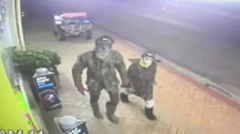Authorities are intensifying their search for remains and investigating the alleged starvation cult led by Paul Mackenzie.
**Grim Discovery Continues in Kenya's Cult Mass Death Investigation**

**Grim Discovery Continues in Kenya's Cult Mass Death Investigation**
Nine additional bodies found raise concerns about ongoing cult activity in Shakahola Forest.
The unsettling discovery of nine bodies in newly excavated graves in Kenya highlights the chilling continuation of a notorious cult case linked to mass starvations in the Shakahola Forest. The gruesome unearthing follows previous findings where over 400 bodies were recovered earlier this year, all believed to be followers of Paul Mackenzie, a self-styled pastor accused of promoting starvation as a path to divine salvation.
The ongoing investigations were dramatically intensified after the unexplained disappearance of children drew attention back to the suspected ongoing activities of the cult, prompting further searches ordered in July. Kenyan prosecutors have since arrested 11 individuals in connection with this case, of which three members were reportedly part of Mackenzie's sect at the time of the initial Shakahola atrocities.
The most recent exhumations uncovered five bodies on Thursday and four more the following day at the Kwa Binzaro site, underlining fears expressed by the Kenyan government regarding the potential resurgence of the cult. As recently as April, Interior Minister Kipchumba Murkomen revealed accusations that Mackenzie was communicating with his followers from prison, allegedly using a mobile phone.
While Mackenzie has pleaded not guilty to the charges of manslaughter, authorities highlighted that he instructed his followers that withholding food would expedite their entry into heaven. Notably, a Mombasa court recently postponed his trial due to the emergence of new evidence linked to the case.
Richard Njoroge, a government pathologist involved in the investigations, has indicated that the search for more remains in the expansive area is still ongoing. The authorities are appealing to the public for assistance in identifying potentially missing loved ones, directing them to register at the Malindi District Hospital where DNA samples are being collected.
Human rights activist Hussein Khalid, who witnessed the exhumations, noted that the grave conditions suggested foul play, as one of the sites appeared recently disturbed with only fragments of clothing remaining. This disturbing insight raises alarm about the allegations that the vanished individuals buried there might have included women and children.
Kenyan officials continue to grapple with the implications of such extremist ideologies that led to extreme actions and suffering among vulnerable populations. As investigations persist, the unfolding tragedy reminds of the dire consequences of unchecked cult influences in society.
The ongoing investigations were dramatically intensified after the unexplained disappearance of children drew attention back to the suspected ongoing activities of the cult, prompting further searches ordered in July. Kenyan prosecutors have since arrested 11 individuals in connection with this case, of which three members were reportedly part of Mackenzie's sect at the time of the initial Shakahola atrocities.
The most recent exhumations uncovered five bodies on Thursday and four more the following day at the Kwa Binzaro site, underlining fears expressed by the Kenyan government regarding the potential resurgence of the cult. As recently as April, Interior Minister Kipchumba Murkomen revealed accusations that Mackenzie was communicating with his followers from prison, allegedly using a mobile phone.
While Mackenzie has pleaded not guilty to the charges of manslaughter, authorities highlighted that he instructed his followers that withholding food would expedite their entry into heaven. Notably, a Mombasa court recently postponed his trial due to the emergence of new evidence linked to the case.
Richard Njoroge, a government pathologist involved in the investigations, has indicated that the search for more remains in the expansive area is still ongoing. The authorities are appealing to the public for assistance in identifying potentially missing loved ones, directing them to register at the Malindi District Hospital where DNA samples are being collected.
Human rights activist Hussein Khalid, who witnessed the exhumations, noted that the grave conditions suggested foul play, as one of the sites appeared recently disturbed with only fragments of clothing remaining. This disturbing insight raises alarm about the allegations that the vanished individuals buried there might have included women and children.
Kenyan officials continue to grapple with the implications of such extremist ideologies that led to extreme actions and suffering among vulnerable populations. As investigations persist, the unfolding tragedy reminds of the dire consequences of unchecked cult influences in society.
















